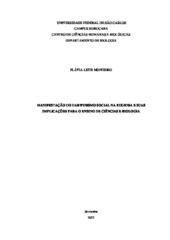| dc.contributor.author | Monteiro, Flávia Leite | |
| dc.date.accessioned | 2021-11-24T17:01:30Z | |
| dc.date.available | 2021-11-24T17:01:30Z | |
| dc.date.issued | 2021-11-03 | |
| dc.identifier.citation | MONTEIRO, Flávia Leite. Manifestação do Darwinismo Social na Eugenia e suas implicações para o ensino de Ciências e Biologia. 2021. Trabalho de Conclusão de Curso (Graduação em Ciências Biológicas) – Universidade Federal de São Carlos, Sorocaba, 2021. Disponível em: https://repositorio.ufscar.br/handle/ufscar/15154. | * |
| dc.identifier.uri | https://repositorio.ufscar.br/handle/ufscar/15154 | |
| dc.description.abstract | Since the beginnings of society, forms of segregation and hierarchization among peoples have been naturalized by human beings. With the development of modern science, scientific arguments that could justify the marginalization of certain groups in society began to be sought. In this context, Social Darwinism and its aspects, including eugenics, have been emerged. Eugenicist thinking preaches that there is an ideal eugenic type, and that, through artificial selection, it would be possible to improve the human being. The eugenics movement was very strong during the first decades of the 20th century; however, it is a mistake to believe that the eugenic discourse is no longer reproduced today. The current work seeks to understand to what extent the critical approach to eugenic discussions in science and biology classes can contribute to overcoming attempts to naturalize sociocultural prejudices. For this end, the role of critical education in the area of science was discussed, and how important it is to break with the ideal of neutral and unattainable science. Phrases from recognized authors were also selected through interviews in newspapers and magazines, original books by these authors and scientific articles. After this, the phrases were subdivided into four categories: genetic determinism, geographic determinism, hygienism and scientific racism. The chosen methodology was qualitative research, through documentary research, to carry out the analysis of the author's discourse on a sociocultural view of genetics and evolution. The explanatory limits of these phrases were worked throughout the work using concepts of genetics and evolution to counteract the eugenic ideas contained in them, trying to interpret it within the cultural context in which the sentence was emitted. With the development of the work, it can be concluded that working with eugenics in the classroom is one of the ways to contextualize teaching and can help to overcome prejudices, transforming the reality of the student, a fundamental step in exercising a critical education. | en |
| dc.description.sponsorship | Não recebi financiamento | por |
| dc.language.iso | por | por |
| dc.publisher | Universidade Federal de São Carlos | por |
| dc.rights | Attribution-NonCommercial-NoDerivs 3.0 Brazil | * |
| dc.rights.uri | http://creativecommons.org/licenses/by-nc-nd/3.0/br/ | * |
| dc.subject | Ensino | por |
| dc.subject | Genética | por |
| dc.subject | Teaching | en |
| dc.subject | Genetics | en |
| dc.title | Manifestação do Darwinismo Social na Eugenia e suas implicações para o ensino de Ciências e Biologia | por |
| dc.title.alternative | Manifestation of Social Darwinism in Eugenics and its Implications for the teaching of Science and Biology | en |
| dc.type | TCC | por |
| dc.contributor.advisor1 | Franco, Fernando de Faria | |
| dc.contributor.advisor1Lattes | http://lattes.cnpq.br/5290956002281250 | por |
| dc.contributor.advisor-co1 | Silva, Antônio Fernando Gouvea da | |
| dc.contributor.advisor-co1Lattes | http://lattes.cnpq.br/9621931288117213 | por |
| dc.description.resumo | Desde os primórdios da sociedade, formas de segregação e hierarquização entre povos foi naturalizado pelo ser humano. Com o desenvolvimento da ciência moderna, começou a se buscar argumentos científicos que pudessem justificar a marginalização de determinados grupos na sociedade. É nesse contexto que surge o Darwinismo Social e suas vertentes, entre elas, a eugenia. O pensamento eugenista prega que existe um tipo eugênico ideal, e que, através da seleção artificial seria possível a criação de um ser humano melhorado. O movimento eugenista foi muito forte durante as primeiras décadas do século XX, no entanto, é um equívoco acreditar que o discurso eugenista não é mais reproduzido nos dias de hoje. O trabalho atual busca compreender em que medida a abordagem crítica de discussões eugênicas nas aulas de ciências e biologia pode contribuir para a superação das tentativas de naturalizar preconceitos socioculturais. Para isso foi discutido o papel da educação crítica na área de ciências, e como é importante a quebra com o ideal da ciência neutra e inalcançável. Também foram selecionadas frases de autores reconhecidos, através de entrevistas em jornais e revistas, livros originais dos autores e artigos científicos. Posteriormente, essas frases foram separadas em quatro categorias: determinismo genético, determinismo geográfico, higienismo e racismo científico. A metodologia escolhida foi a pesquisa de caráter qualitativo, através da pesquisa documental, para realizar a análise do discurso de alguns autores sobre uma visão sociocultural da genética e evolução. Os limites explicativos dessas frases foram trabalhados ao longo do trabalho utilizando conceitos de genética e evolução para contrapor a ideias eugenistas contidas nelas, buscando interpretar dentro do contexto cultural em que a frase foi emitida. Com o desenvolvimento do trabalho, pode-se concluir que trabalhar a eugenia em sala de aula é uma das formas de contextualizar o ensino e pode auxiliar na superação de preconceitos, transformando a realidade do educando, passo fundamental para se exercer uma educação crítica. | por |
| dc.publisher.initials | UFSCar | por |
| dc.subject.cnpq | CIENCIAS HUMANAS::EDUCACAO::ENSINO-APRENDIZAGEM | por |
| dc.publisher.address | Câmpus Sorocaba | por |
| dc.contributor.authorlattes | http://lattes.cnpq.br/6250544937553628 | por |
| dc.publisher.course | Ciências Biológicas - CBL-So | por |

